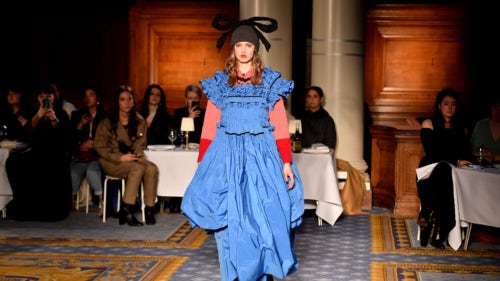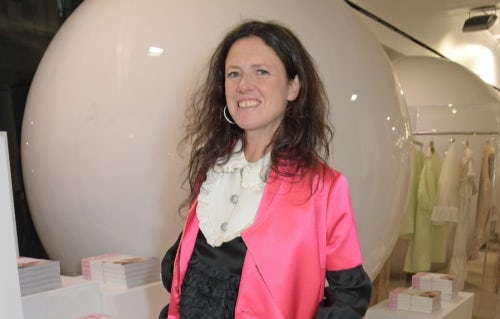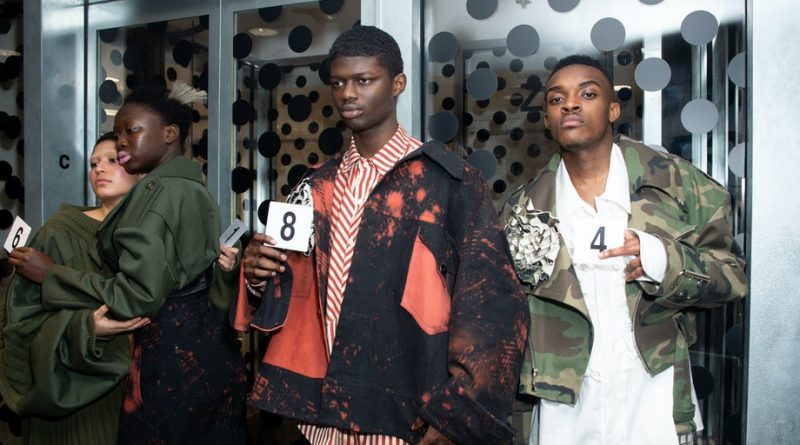Can Brand Accelerators Save Emerging Labels from the Pandemic? | BoF Professional, This Week in Fashion
This week, Dover Street Market Paris (DSMP), Comme des Garçons’ platform for emerging brands, announced new partnerships with Vaquera and designer Victor Weinsanto, adding to the five labels already in the DSMP stable: Honey Fucking Dijon, Youths in Balaclava, Liberal Youth Ministry, ERL and Rassvet, which evolved out of CDG’s now-closed Gosha Rubchinskiy label.
DSMP has different relationships with each of its labels, offering them a range of services, from brand management to production to distribution, though it does not have ownership stakes in any. The platform will work with Vaquera on the production and distribution of its Spring 2021 collection, and will simply offer Weinsanto showroom space to connect with buyers for now.
“Dover Street Market is a platform to change the system and be open to all different ways of working. What I like is the organic nature of it — everyone at their own pace, it is very free,” explained Adrian Joffe, President of Dover Street Market and Comme des Garçons.
DSMP isn’t alone. In recent years, a number of brand platforms have built a new model for bringing high-potential emerging labels to market. Among them are showroom-turned-accelerator Tomorrow (A-Cold-Wall and Coperni), Luca Benini’s Slam Jam (1017 ALYX 9SM and Martine Rose) and Farfetch’s New Guards Group, which launched and scaled Virgil Abloh’s Off-White and, earlier this year, added Ambush and Opening Ceremony to its portfolio.
While each of these platforms has a different approach, with some taking financial stakes in partner labels and others simply taking a commission on sales, they all provide young brands with shared services, from product development to supply chain management to global distribution (in the case of New Guards, this means direct access to Farfetch’s vast digital marketplace), offering an alternative to going it alone in a hyper-competitive market.
Today’s fashion consumers crave newness and authenticity more than ever. And yet it’s harder and harder for fresh emerging brands to tap the opportunity while operating independently.
In the last decade, the fashion landscape has become much more complex and challenging to navigate for independent labels. Digital has certainly changed the game, upending once dependable distribution channels, while giving rise to new competitors. China, too, has added a degree of complexity that many independent labels struggle to manage on their own.
Simultaneously, fashion’s biggest luxury groups, LVMH and Kering, have consolidated their power and flexed their leverage with retailers, mall owners, magazines, influencers and other key players in the fashion ecosystem at the same time as they have lost interest in trying to scale smaller labels, with which they have a poor track record.
Now, Covid-19 is pushing many young brands to the edge. Not only has consumer demand crashed, but the multi-brand retailers on which emerging labels typically depend for distribution are pressuring them to offer discounts on orders and accept worsening sell-through and return-to-vendor terms, undermining profitability and making it even harder to survive.
The crisis has made designers more pragmatic, said Tomorrow Chief Executive and Co-Founder Stefano Martinetto. “The crisis was a reality check. They see it’s no longer possible to do everything themselves,” he explained. Covid-19 has also increased their need for cash.
With many independent brands facing a do-or-die season this autumn, it’s likely that more high-potential labels will team up with platforms that can offer both cash and critical operational support in a turbulent market, while allowing designers to focus on the creative elements of the business, where the greatest value ultimately lies. Martinetto sees the most promise in “brands with purpose, focused on specific community, that never betray their consumers.”
Of course, this isn’t the first time someone has tried to build a platform for scaling emerging fashion brands. Twenty years ago, Pegasus Apparel Group acquired controlling stakes in American labels Pamela Dennis, Daryl K and Miguel Adrover. Pegasus Chairman and Chief Executive Stephen L. Ruzow likened the venture to a record label for young designers. But the business went up in flames. In London, the Centre for Fashion Enterprise, a business incubator founded in 2003 that teamed up with Mary Katrantzou, Erdem and others, never really took off.
But in a fashion market reshaped by digital distribution, globalisation and, now, Covid-19, the timing couldn’t be better, and a new wave of players looks poised to make brand accelerators work.
THE NEWS IN BRIEF
FASHION, BUSINESS AND THE ECONOMY

Molly Goddard Autumn/Winter 2020 | Source: Getty Images
Europe’s fashion weeks coming into focus. Paris Fashion Week is confirmed to go ahead from September 28 to October 6, with a schedule of digital and physical events to follow shortly. Stalwarts like Louis Vuitton and Chanel have already confirmed they will be staging physical shows. Meanwhile, the British Fashion Council has released the provisional schedule for London Fashion Week, featuring a mix of in-person, live-streamed and pre-recorded video events from a total of 80 brands, including Burberry, Victoria Beckham, Simone Rocha and Molly Goddard.
Macy’s posts a $431 million quarterly loss. The department store reported sales of $3.6 billion, up from $3 billion the previous quarter and marginally above analyst estimates of $3.5 billion, but nonetheless represented a near-$2 billion drop from the same period last year. According to interim Chief Financial Officer Felicia Williams, the results pointed to a faster-than-expected recovery.
PVH Corp. beats analysts estimates with quarterly earnings. The owner of Calvin Klein and Tommy Hilfiger reported a surprise quarterly profit, with shares rising over four percent and increased sales projections in China and Europe. The company is still facing uncertainty in North America as a second wave looms and fall shipments are delayed to stores.
Authentic Brands Group finalises Brooks Brothers deal. ABG, which also owns Barneys New York, and SPARC Group successfully acquired the heritage brand known for inventing the American suit on September 1. Brooks Brothers filed for Chapter 11 bankruptcy protection on July 8, joining the spate of other big-name retailers that have been hit by the pandemic.
J.C. Penney woos new bidders in bankruptcy. Lenders controlling J.C. Penney Co.’s bankruptcy may enter a partnership with an outside bidder, after attempts to bring in an independent party were derailed. The plan would involve converting the hedge funds holding the loans into co-owners of the business, working with a third party, Bloomberg reports.
Women’s retailer J. Jill faces bankruptcy. The company has 10 days to get permissions from lenders for a deal that would allow the retailer to extend its debt maturities. If it’s unsuccessful in getting lenders holding 95 percent of its term loans to approve the plan, the company said it plans to file for bankruptcy.
Nike is launching a maternity line. The sportswear giant’s “Nike M” collection will be available September 17, and may cause competitors Lululemon and Adidas to come out with their own maternity offerings. The line has been in development since 2017, and involved testing over 70 materials and applying data from over 150,000 scans of women’s bodies throughout various stages of their pregnancies.
Retailers respond to an influx of searches for Black-owned businesses. After the shooting of Jacob Blake by police in Kenosha, Wisconsin, searches for “Black-owned businesses” surged, with social media users supplying their own lists of businesses to support in their area. Retailers from Target to Etsy to Farfetch have responded with pledges and partnerships with Black-owned businesses.
Hedge fund founder charged in Neiman Marcus bid. Marble Ridge Capital Founder Dan Kamensky faces charges including securities fraud, obstruction of justice and extortion for pressuring investment bank Jeffries to drop its offer for shares in Neiman Marcus Group Inc. so his firm could acquire them for a lower price, according to Bloomberg. Jeffries pulled its bid following the threats and reported Kamensky’s actions to the creditors committee.
THE BUSINESS OF BEAUTY
Estée Lauder will review its skin-lightening products following accusations of racism. The beauty giant, which owns brands like Clinique, La Mer and M.A.C., is reviewing its skincare and makeup products along the lines of “cultural sensitivity,” such as use of language about “lightening” and “brightening” properties, according to a report by Bloomberg. The news follows the growing criticism of rival beauty conglomerates such as L’Oréal, Unilever and Johnson & Johnson perpetuating colourism by touting skin-lightening products.
Kimora Lee Simmons launches beauty brand with daughters Ming and Aoki. Baby Phat Beauty is the latest venture under Simmons’ Baby Phat fashion brand, which she first launched in 1999 and bought back last year. Simmons joins the growing list of celebrities to enter the beauty and wellness space in recent months, such as Jennifer Lopez, Alicia Keys, Selena Gomez and Kate Hudson.
PEOPLE

Katie Grand at Dover Street Market | Source: Getty Images
Katie Grand exits Love magazine. “The world has changed, and I have changed, and what is important is now so clear,” the stylist and fashion editor wrote in an Instagram post announcing her departure. “Telling beautiful and important stories will never change. But it’s time for something new, it’s time for something different.” Grand founded the bi-annual title with Condé Nast International in 2009. A succession plan has yet to be announced.
LVMH hires vice president for diversity and inclusion. Corey Smith joins LVMH’s North American arm, LVMH Inc., from a similar role at Major League Baseball. In his new role, he will report to Gena Smith, senior vice president of human resources and head of global executive and creative recruitment.
Jimmy Choo names Hannah Colman CEO. Initially appointed interim chief executive following the departure of Pierre Denis earlier this year, Colman will now assume the role in full, reporting to Capri Holdings Chairman and Chief Executive John D. Idol. A company veteran, Colman first joined Jimmy Choo in 1996 as a store manager and went on to serve as president of EMEA and global e-commerce, among other roles.
Valentino appoints CEO for the Americas. Laurent Bergamo, previously general manager of the Middle East region for the house, has been promoted with immediate effect. In his new role, he will report to Valentino Chief Commercial Officer Marco Giacometti and oversee development for retail, wholesale and online channels across the US, Canada and Mexico.
Adidas global creative director and Yeezy general manager depart. Paul Gaudio has stepped down as global creative director, a role he held since 2014. The sportswear brand did not comment on his departure, but it follows controversial comments Gaudio made on social media regarding a teenager involved in a fatal shooting during protests in Kenosha, Wisconsin. Jon Wexler, general manager of Adidas-Kanye West tie-up Yeezy, has also left the company.
MEDIA AND TECHNOLOGY
Former Vogue Brazil employees report a culture of humiliation, bullying and mistreatment. Testimonies from almost 30 former staffers recount witnessed and lived experiences of a toxic workplace dating back years, the worst of which often centring around Editor Daniela Falcão. The accusations, reported by Buzzfeed, come amid a wider reckoning in the media industry, as former and current employees at a range of titles have been speaking out about toxic work environments and institutionally entrenched oppressive mindsets such as elitism and racism.
Highsnobiety has a new editorial director. Christopher Morency joined Highsnobiety as editor-at-large in 2018 and before that held roles at BoF, Fantastic Man and Vice. Jian DeLeon, who previously held the role, has been made men’s fashion and editorial director at Nordstrom with immediate effect. The news of the appointment comes after an eventful few months for the title, which launched a new print magazine HIGHStyle in March and, like many media companies, made significant layoffs in April.
Amazon gets the green light to deliver by drone. Amazon Prime Air, which delivers packages within 30 minutes, has received US regulatory approval to use autonomous drones for the service. The e-commerce giant joins UPS and Alphabet subsidiary Wing in being able to use the technology. On the other side of the Atlantic, Amazon has entered a deal to buy 1,800 electric vans from Mercedes-Benz in its biggest commitment so far to curbing carbon emissions in its European operations.
Compiled by MC Nanda and Rachel Deeley.
BoF Professional is your competitive advantage in a fast-changing fashion industry. Missed some BoF Professional exclusive features? Click here to browse the archive.

